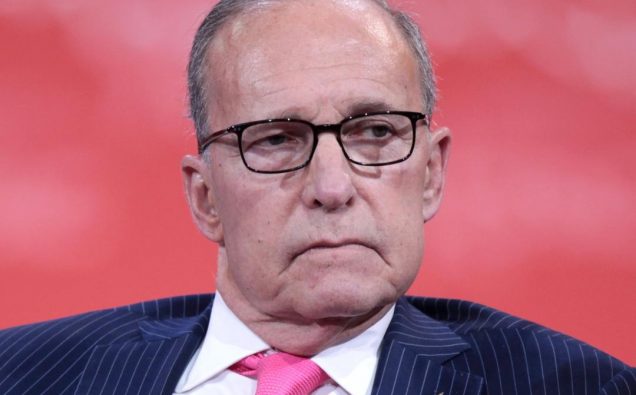
Photo Credit: Gage Skidmore/Wikimedia Commons
The U.S. economy continues to generate encouraging number of jobs and the stock market has also been responding optimistically to President Donald Trump’s promises of infrastructure revamp and tax reforms.
But in the midst of these hopeful prospects, President Trump has also announced to levy heavy taxes on import of steel and aluminum, shaking up the trade scenario, and evoking the possibility of tit-for-tat retaliation from major trade partners.
The president has assured Mexico and Canada of waivers but the future of NAFTA in its current form is also unclear.
On Wednesday, Trump added a new member to his economic team, picking conservative commentator with CNBC, Larry Kudlow, as his chief economic adviser.
If and how Kudlow, 70, who also served in Donald Reagan Administration, will shape the administration’s policies which are intertwined with political discussions is a million dollar question.
Larry Kudlow will be my Chief Economic Advisor as Director of the National Economic Council. Our Country will have many years of Great Economic & Financial Success, with low taxes, unparalleled innovation, fair trade and an ever expanding labor force leading the way! #MAGA
— Donald J. Trump (@realDonaldTrump) March 15, 2018
The question is interesting in view of Kudlow’s past criticism of Trump’s policies that contrasts with the prospect of his being able to shape the future policies.
For example, as noted by The Guardian, Kudlow wrote in a March 3 piece that Trump should reconsider his move to impose steel tariffs.
“Trump should also examine the historical record on tariffs, because they have almost never worked as intended and almost always deliver an unhappy ending,” Kudlow wrote in a National Review, along with co-authors Stephen Moore and Arthur Laffer.
On the other hand, conservative media highlight Kudlow’s ability to bolster President Trump’s economic growth agenda as head of the National Economic Council.
“There is no more passionate advocate of having the president issue an executive order to index capital gains for inflation. Unlocking frozen assets and stimulating investment, such a move would further turbocharge the U.S. economy,” John Fund wrote on Fox News website.
The European Union, wonderful countries who treat the U.S. very badly on trade, are complaining about the tariffs on Steel & Aluminum. If they drop their horrific barriers & tariffs on U.S. products going in, we will likewise drop ours. Big Deficit. If not, we Tax Cars etc. FAIR!
— Donald J. Trump (@realDonaldTrump) March 10, 2018
Meanwhile, China and other major European countries are looking to see how President proceeds with the implementation of his trade tariffs. Some analysts say if other countries react with imposition of tariffs of their own on U.S. exports, such a collision course could have serious implications, including trade wars.
In his first comments, as top U.S. economic adviser, Kudlow offered a glimpse into what he could bring to the Administration’s quest for even-handed trade.
In a stiff trade rhetoric against Beijing, Kudlow, said China “has earned a tough response” from the U.S. and other nations.
This mix of rhetoric, experience will certainly impact the international trade and even world economic growth, which has only recently shown signs of uptick.


















